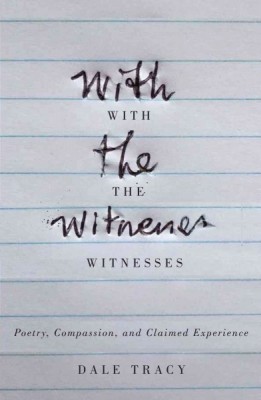| With the Witnesses: Poetry, Compassion, and Claimed Experience Contributor(s): Tracy, Dale (Author) |
|
 |
ISBN: 0773550283 ISBN-13: 9780773550285 Publisher: McGill-Queen's University Press OUR PRICE: $33.20 Product Type: Paperback - Other Formats Published: June 2017 * Not available - Not in print at this time * |
| Additional Information |
| BISAC Categories: - Literary Criticism | Semiotics & Theory |
| Dewey: 809.193 |
| LCCN: 2017431624 |
| Physical Information: 0.8" H x 5.9" W x 8.9" (0.95 lbs) 264 pages |
| Descriptions, Reviews, Etc. |
| Publisher Description: While trauma theory has been adopted by contemporary literary and cultural studies as an ethical way to study depictions of suffering, there is a risk that its present use could cause more harm than good. By emphasizing inaccessible histories, unspeakable suffering, and unconscious witnessing, trauma theory may lead readers to claim others' suffering through empathic identification. In With the Witnesses, Dale Tracy argues that poetry offers an alternative approach to engage with not only suffering in art but suffering in general. Examining the strategies of witness poetry, Tracy interrogates and reformulates the dominant models of trauma studies in which readers take over the witnessing position by identifying with the speaker as a witness. Against this metaphoric logic of substitution, Tracy proposes compassion as a mode of response that is consistent with the poetry's metonymic strategies. She examines poems by renowned international authors such as Seamus Heaney, Dionne Brand, Les Murray, and Adrienne Rich, as well as several lesser-known writers. Discussions of poems that respond to diverse national and transnational contexts of atrocity, conflict, and marginalization guides With the Witnesses toward a compassionate response to suffering that involves contiguity rather than substitution, nearness rather than likeness, and most importantly, feeling with - not as - another. Following each poem as a unique theory of compassion, With the Witnesses demonstrates that a witness can stand with those who suffer without standing in for them. |
Contributor Bio(s): Tracy, Dale: - CA |